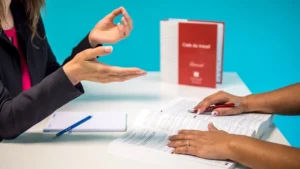KPA Lawyers – April 2, 2020

With all the uncertainty individuals in Ontario, and elsewhere, are facing as a result of COVID-19 shutdowns, eviction restrictions, quarantines and social distancing, I have had quite a few questions from home buyers and sellers about whether they can “back out” of an Agreement or what they can do to protect themselves going into an agreement.
I have been paying close attention to the Law Society of Ontario and Federation of Ontario Law Association guidelines’ regarding real estate transactions and I’ve participated in a Continuing Professional Development seminar hosted by the best in the industry on COVID-19 and Real Estate Law. What I have taken away from all of this is nothing has changed when it comes to a party’s fulfillment of their obligations under an Agreement of Purchase and Sale.
There is no case law or legal principle that discusses the effect of a pandemic on contracts and none of the government shutdowns address contracts. What that leaves parties to these agreements with, are the basic principles of contract law.
For those who have entered into an Agreement of Purchase and Sale and all conditions have been met, you are in a “firm deal.†There was an offer, acceptance, consideration, mutual agreement as to terms and all parties were competent. All that is left to do is act reasonably and fairly in the completion of the Agreement.
If you are in a position where you are no longer able to close the transaction, as a buyer or seller, and the parties cannot agree to an amendment of the Agreement, you will be in breach and the standard legal repercussions are applicable.
It may seem harsh given the times, but there has been no case law to suggest that people who breach Agreements as a result of a pandemic are entitled to accommodations. Furthermore, what you are entitled to is very different than what reasonable people are able to agree upon.
If you find yourself in a situation where you are worried you will not be able to close your transaction, speak with your lawyer and, together, you can reach out to the other party to discuss potential amendments. Just be wary of saying declaratory statements like “We cannot close the transaction†in these conversations because it might be interpreted as Anticipatory Breach. The courts have traditionally favoured fair play between contractual parties and if a party is acting highhanded or taking arbitrary and unreasonable actions, the court could very well look negatively upon that specific party. This is so regardless of whether a pandemic is assaulting the masses and hijacking society. Consider how that attitude by the courts may react to such behavior given the present-day situation.
What I am not about to continue to do in this article is opine on what the courts will do. I can only tell you what has traditionally been done but even then, courts have a way of distinguishing cases no matter how on point it may seem to your situation. Every transaction and party is different and your options will be reflective of that.
Real estate lawyers, in facilitating Agreements, are to act in the best interest of their client(s) regardless of whether the client’s Agreement existed, and was firm, prior to COVID-19 shutdowns or the client is asking for advice on a new Agreement, conditional upon solicitor review (a condition I encourage all purchasers and sellers to have in their Agreements). If you have concerns, speak with your lawyer or find one.
As for those individuals who are looking to purchase or sell at the moment, you need to have a very candid conversation with your lawyer about what you want from a particular offer. There have been “COVID-19 clauses†floating around amongst professionals in the industry, but they are standard and by no means fulsome. If you are trying to build automatic or optional postponements of your closing date into the Agreement by reason of COVID-19, you need to make sure the result is ultimately what you want and that every aspect of these postponement options have been accounted for. For instance:
1. Will occupancy or possession be allowed for the purchaser if a postponement is made?
       a. If so, what is the Purchaser allowed or not allowed to do with the property while in the                Purchaser’s possession?
       b. You will also need to include a waiver and indemnification into the Agreement in favour of             the Seller for damage done to the property by the Purchaser.
2. Will the Statement of Adjustments be calculated for the original Completion Date or the Extended Date?
3. Will both parties maintain their home insurance until the Extended Date? Or just the Vendor? Who will pay for this?
4. How many extensions of the Completion Date are to be allowed?
In addition to the above factors, it is important to include in any and all amendments and postponements that time is of the essence and all parties are to make best efforts to complete the transaction.
Once you have entered into an unconditional Agreement of Purchase and Sale meaning it is “firm,†you have an obligation to perform and perform in good faith. If you are worried you will not be able to do so or would like to enter into an Agreement and want to cover your bases, speak with your Real Estate Lawyer to discuss how you can proceed.
This articles is intended to be information and does not constitute legal advice. Every situation is different. KPA Lawyers is open and offering free telephone consultations in an effort to maintain public access to legal information during this difficult time. If you need advice about your transaction, give us a call at 905-965-626



